#bbc urdu pakistan news
Text
Two bomb explosions near candidates' offices in the Pakistani province of Balochistan killed at least 28 people and wounded dozens on the eve of general elections, officials said.
The first blast killed 16 people in Pishin district, north of Quetta city.
A second explosion left 12 people dead in Qila Saifullah to the east. There was no immediate claim for the attacks.
The vote has been marred by violence and claims of poll-rigging. Former PM Imran Khan is barred from contesting.
Police are still trying to determine the cause of the two blasts.
Resource-rich Balochistan - Pakistan's largest, and poorest, province - has a history of violence. It has seen a decades-long struggle for greater autonomy by various groups, some of them armed. Islamist militants, including the Pakistani Taliban (TTP), operate along the border with Afghanistan.
The bomb in Pishin, a town about 100km (62 miles) south-east of the Afghan border, went off in front of an independent candidate's party office. The provincial authorities said 25 people were also wounded.
Images on social media showed cars and motorbikes blown apart by the force of the explosion. Officials told the BBC the candidate was meeting his polling agent at the time.
The second blast targeted the election office of the JUI-F party. A senior police official told AFP news agency it took place in the main bazaar of Qila Saifullah, about 190km (120 miles) east of Quetta.
Twenty people were wounded in the incident and the number of casualties in the two attacks could rise, officials said.
There have been violent incidents in both Balochistan and Khyber Pakhtunkhwa provinces in the week before Thursday's vote, and the violence in Pishin and Qila Saifullah was not unexpected.
In mid-January, Baloch Liberation Army-Azad (BLA) insurgents released a pamphlet after claiming responsibility for bombing an election training office. The pamphlet urged people to boycott the elections. Soon after, reports of hand grenade attacks on political party offices were reported from various cities in the province.
Many voters in Balochistan feel neglected by the country's political parties, given the province has so few seats in parliament. They often feel candidates are foisted on them, with few if any links to Balochistan.
And many feel the vote is unfair. "It is a selection," numerous people told BBC Urdu in the city of Turbat last month.
Following Wednesday's attacks, the Balochistan government said Thursday's vote would proceed as planned.
"Rest assured, we will not allow terrorists to undermine or sabotage this crucial democratic process," provincial information minister Jan Achakzai posted on X, formerly Twitter.
More than 128 million voters are eligible to cast ballots in the election. In Pakistan's first-past-the-post system, 266 of 336 National Assembly seats are directly elected.
But many people are questioning the credibility of the vote as Khan and his party, the PTI, have been sidelined.
The PTI won the largest number of seats in the last general election but Khan was jailed on corruption charges last year and disqualified from running for public office. Last week he was convicted in three other cases and faces years in prison - he says all the charges are politically motivated.
The authorities deny carrying out a crackdown, but many PTI leaders are behind bars, in hiding or have defected. Thousands of the party's supporters were rounded up after protests - at times violent - when Khan was taken into custody last year.
PTI candidates are having to run as independents following the electoral commission's decision to strip the party of its cricket bat symbol. Electoral symbols are vital in helping voters mark their ballots in a country with high rates of illiteracy.
The man tipped to win Thursday's election is three-time former PM Nawaz Sharif, who himself was behind bars at the last election. Analysts say it appears he has done a deal with the military to facilitate his return to politics.
A high turnout will be key to the PTI's chances, many analysts say. How to tackle, and who to blame for, the country's economic crisis will be high in voters' minds. Results must be announced within 14 days of the election.
3 notes
·
View notes
Text
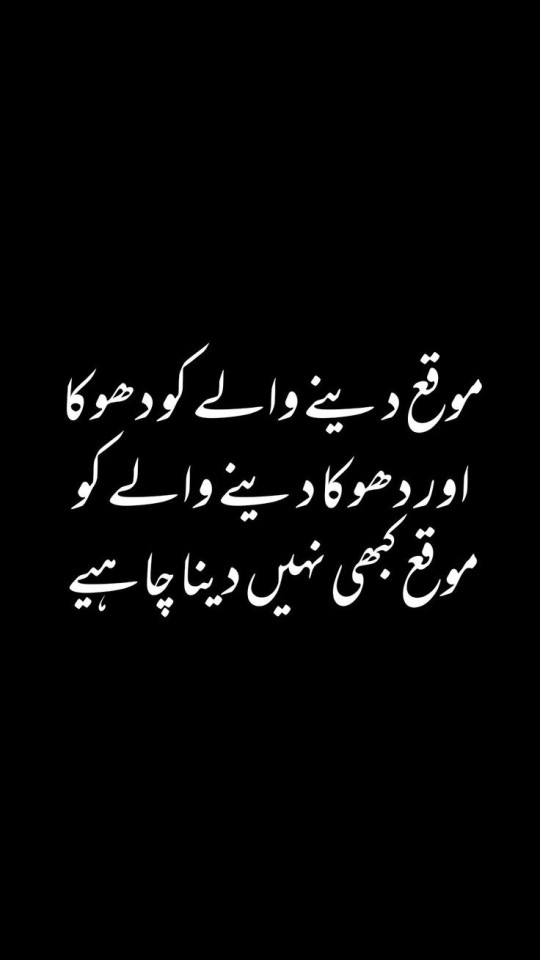
Urdu adab #qurandaily #Pakistan
#DrIsrarAhmed #islam #quranrecitation #PakistanUnderFascism #pakistaneconomy #pakistanidrama #PakistanZindabad #pakistanifashion #imrankhanfans #ImranKhanPTI #ImranKhan #ImranRiazKhan #ImranKhanZindabad #ImranKhanLive #PTI #ptipunjab #PTIofficial #PTITMultimediaChallenges #urdupoetry #urdu #urduquotes #urduadab #urdushayari #urdulines #UrduNews #اردوشاعری #اردو #اردوترجمہ #اردوادب #سنہرے Urdu News Urdu Cover BBC URDU DW اردو Urdu Ghazal اردو غزل اردو ناول اینڈ کہانیاں The Urdu Writings: ہم اُردو ہیں اردو ادب و شاعری
#urdu shayari#urdu poetry#urdu#urdu shairi#urdupoetry#urdu quote#urdu poem#urduadab#poetry#urdu adab#urdu language#urdu ghazal#urdu literature#urdu stuff#urdu ashaar#urduposts#urdushairi#urdushayari#urdusaying#urdusadpoetry#urdushayri#urdu stories#urdu sad poetry#urdu songs#اردو شاعری#اردو#اردو زبان#اردو پوسٹ#اردوشاعری#اردو شعر
4 notes
·
View notes
Text
Malala Yousafzai (1997-Present) Female education activist & Awarded Noble Peace Prize in 2014
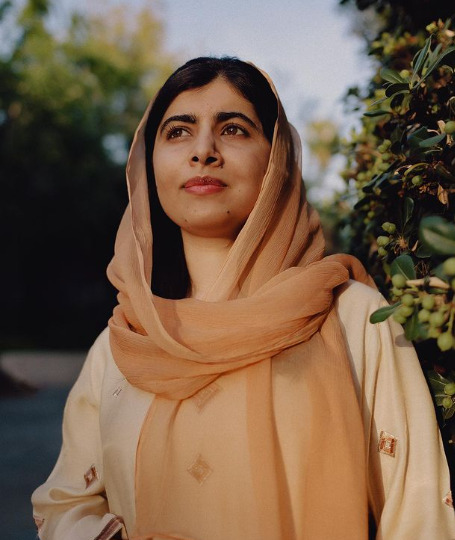
On July 12, 1997, Malala was born in Mingora, Pakistan to Ziauddin and Toor Perkai Yousafzai. Her father Ziauddin is an education activist and teacher, running a girls' school in their village located in Swat Valley until 2008 when the Taliban took over the town. The Taliban banned many things and even banned girls from attending school, Malala was just 11 years old. After this, she wrote a blog for the BBC Urdu detailing her experiences under Taliban occupation, which caught the attention of New York Times journalist Adam B. Ellick, who later made a documentary about her life and the state of Pakistan. This is only the beginning of Malala's activism, a few years later in 2012 a masked gunman attempted to assassinate her while she headed home on a bus after finishing an exam. He shot her in the left side of her head and was transported to Rawalpindi Institute of Cardiology and then the Queen Elizabeth Hospital in Birmingham, UK. While she recovered, Muslim clerics issued a fatwā against her, thankfully Malala and her family moved to the UK. The Taliban were internationally denounced by governments, feminist and human rights activist groups. Once she recovered, she founded the Malala Fund with her father. The Malala Fund is a non-profit organization that advocates for girls' education. She also received Pakistan's first National Youth Peace Prize. In 2013 she published her book I Am Malala, an international best seller, and won the Sakharov Prize.
In 2014, she was awarded the Noble Peace Prize at age 17, alongside Kailash Satyarthi from India (an activist against child labor) for her efforts with the Malala Fund and her general activism for girls' education. In 2015, she was in the Oscar-shortlisted documentary He Named Me Malala, and even was featured in the Time Magazine. She wrote a children's book in 2017 as well, on top of also becoming a UN Messenger of Peace the same year. In 2018 she studied Philosophy, Politics, and Economics at the University of Oxford, graduating in 2020. During her time in college, she traveled to multiple countries, including her hometown to share other girls' stories and cover issues outside of education such as period poverty, and even today more girls' experiences are being shared with the world. Malala's social media platforms are helping bring more awareness and action towards her cause. I would highly recommend checking out her Twitter, Instagram, and Tiktok, as these platforms are very active and provide a better insight into other girls' experiences, what she has achieved, and why it is worth fighting for the nearly 130 million girls who cannot have an education today.
Malala has achieved so many things in her life so far, it truly is incredible how the Malala Fund has come to having over $22 million dollars in donations and helping girls in 8 countries. She has done an incredible amount of work advocating for women and girls all across the world. There is still a lot of work to be done, but Malala and so many others will continue to advocate and fight for girls and women's rights.
Malala's Social Media:
Twitter: @ Malala
Instagram: @ malala
TikTok: @ malalafund
The Malala Fund:
Interested in her book I Am Malala? Here's a link for it on amazon:
Malala's Magic Pencil : https://www.amazon.com/Malalas-Magic-Pencil-Malala-Yousafzai/dp/0316319570
➡ Here's a link to watch/listen to the book! Malala's Magic Pencil by Malala Yousafzai
Interested in watching He Named Me Malala? You can watch it on YouTube, Amazon Prime Video, or Vudu for $3.99.
For more information on Malala Yousafzai (Noble Prize, Time Magazine, etc…):
Time Log: 01:01:25
0 notes
Text
Islamabad — In the tiny, remote village of Bandli, high up in the mountains of Pakistan-administered Kashmir, local officials were circulating a grim list on Friday. On it are the names of 11 missing men. They are believed to be among the hundreds of people who were crammed by human traffickers onto an old fishing boat that sank off the coast of Greece last week, thousands of miles from their homes, as they tried to make it to European soil.
It was one of the deadliest maritime disasters in Europe in decades.
The men from Bandli were among an estimated 400 to 750 people from Pakistan, Egypt, Syria and other countries packed onto the fishing boat when it sank about 50 miles from the southern Greek town of Pylos on June 14.
Pakistan has grappled for months with a complete economic meltdown, spurring more and more people to risk their lives to reach Europe in search of a better future.
CBS News' partner network BBC sent a team from its World Service, Urdu channel to Bundli, where they met Raja Anwar standing on the roof of his house, staring vacantly at the gate to his property.
His 38-year-old son Abdul sent Anwar a message to say he was getting on the boat in Libya just before it set off on June 14.
"We had to take a huge loan of 22 lakhs ($8,000) from our extended family to pay for his journey," Anwar told the BBC.
He said his village had lost a young generation of men, including his son and four nephews, the youngest of whom, Owais Tariq, was only 19. All the men but one were married with young children, he said.
The boat the would-be migrants were on had a capacity for far fewer people, and when it became clear that it was capsizing, the captain reportedly abandoned ship and left them to their fate. Of the hundreds who were on the boat – which one group said may have included many children – only 104 were rescued. Greek authorities have recovered 82 bodies so far.
Pakistan appears to have had the highest number of nationals on board the doomed vessel. The country's Interior Minister, Rana Sanaullah, told parliament Friday that at least 350 Pakistanis were on the boat, adding that a total of 281 families had contacted the government to seek help and information.
Another 193 Pakistani families have already been DNA-tested to match with the remains of victims found, or to keep on file with so many people still officially missing after the shipwreck.
Pakistan has arrested several alleged human traffickers and their agents, who have told authorities their ringleader was based in Libya, from which the boat set sail on the North African coast.
These human smugglers allegedly charged around $8,000 per person to illegally take the Pakistani nationals to Europe across the Mediterranean from Libya – a dangerous sea crossing that has become busier as European nations have worked to seal their land borders. The migrants had been flown legally to Dubai, Egypt and directly to Libya, authorities said.
An official inquiry was underway to identify and arrest any others involved in the human smuggling, Sanaullah said, adding that Pakistan's government was also working to recommend amendments to laws to increase the likelihood of convictions in such cases.
The interior minister said not a single human trafficker had been convicted in Pakistan in more than five years, adding that it was mostly due to victims' families agreeing to pardons in exchange for money.
Given Pakistan's deep economic woes, it's unclear what effect any efforts to tackle irregular migration could have in the country.
Pakistanis are grappling with inflation at an almost unfathomable rate of 38%. A rapidly depreciating currency and external deficit led the government to adopt drastic measures over the past year to avoid a national default.
But those measures dealt a huge blow to domestic growth and jobs. The industrial sector, Pakistan's economic engine, has contracted almost 3% in the current financial year according to provisional data. That has put a huge strain on a nation with a population of over 230 million and a generally young population that's pushing 2 million new people into to the labor force every year.
Official unemployment data have not been published in two years. But Hafeez Pasha, a former finance minister and economist renowned for his work on Pakistan's labor issues, has put the unemployment rate at a record "11-12%, conservatively."
Behind only Egypt and Bangladesh, Pakistan has the most nationals currently being registered as arriving asylum seekers in Italy, the European border agency Frontex told the Reuters news agency.
Of the arrivals this year through May, a record 4,971 Pakistanis tried to make the central Mediterranean crossing in a single year, according to Frontex data recorded since 2009.
Legal migration opportunities are limited, and that stark figure represents those who have actually made it to Italy.
Many, like the hundreds of people now lost from the boat off southern Greece, see no option but to try to make arrangements through agents who often present illegal routes as a quicker, cheaper, or even the only way to reach Europe, according to the Migrant Resource Centre, a EU-funded organization that provides information and counseling to migrants.
In the village of Bandli, 11 desperate families were left clinging to hope Friday that they might still get word their loved ones were among the lucky ones rescued.
That hope was fading fast, and pain was already etched on the faces of the mothers, fathers and other relatives wondering if their loved ones were among the 12 Pakistani nationals who Greek officials say were pulled out of the water alive.
0 notes
Text
No change, hardships increased after new army chief, claims Imran Khan
Ex-prime minister Imran Khan addresses a rally in this file photo. —AFP/File
Imran Khan “doesn’t need establishment”.
PTI chief says will not talk to “scoundrels”.
Says PDM parties want to send him to jail.
LAHORE: Pakistan Tehreek-e-Insaf Chairman Imran Khan has claimed that their problems have increased after the appointment of the new army chief.
In an interview with BBC Urdu, the former…

View On WordPress
0 notes
Text
Mohammed Hanif : Biography and List of Works
Mohammed Hanif (born November 1964) is a British Pakistani writer and journalist who writes a monthly opinion piece in The New York Times. Hanif is the author of the critically acclaimed book A Case of Exploding Mangoes, which was long-listed for the Booker Prize, shortlisted for the Guardian First Book Award, and won the Commonwealth Prize for Best Book. His second book, Our Lady of Alice Bhatti, won the Wellcome Book Prize. He also worked as a correspondent for the BBC News based in Karachi and was the writer for its acclaimed drama and the feature film, The Long Night. He work has been published by The New York Times, The Daily Telegraph, The New Yorker and The Washington Post. His play The Dictator's Wife has been staged at the Hampstead Theatre.
Life
He was born in Okara, Pakistan. He graduated from Pakistan Air Force Academy as a pilot officer, but subsequently left to pursue a career in journalism. He initially worked for Newsline and wrote for The Washington Post and India Today. He is a graduate of the University of East Anglia. In 1996, he moved to London to work for the BBC. Later, he became the head of the BBC's Urdu service in London. He moved back to Pakistan in 2008.
Works
His first novel A Case of Exploding Mangoes (2008) was shortlisted for the 2008 Guardian First Book Award and longlisted for the 2008 Man Booker Prize. It won the 2009 Commonwealth Book Prize in the Best First Book category and the 2008 Shakti Bhatt First Book Prize. Hanif has also written for the stage and screen, including a feature film, The Long Night (2002), a BBC radio play, What Now, Now That We Are Dead?, and the stage play The Dictator's Wife (2008). His second novel, Our Lady of Alice Bhatti, was published in 2011. It was shortlisted for the Wellcome Trust Book Prize (2012), and the DSC Prize for South Asian Literature (2013). He is currently collaborating with composer Mohammed Fairouz on an opera titled Bhutto. Hanif's style has often been compared with that of author Salman Rushdie. But Hanif disagrees. Even though he says that he enjoys reading Rushdie's books, he would not want to suffer the same fate as Rushdie did.
Bibliography
Films
The Long Night (Script) (2002)
Novels
A Case of Exploding Mangoes (2008)
Our Lady of Alice Bhatti (2011)
The Baloch who is not missing and others who are (2013)
Red Birds (2018)
Plays
What Now, Now That We Are Dead? (radio play)
The Dictator's Wife (2008)
Courtesy : Wikipedia
0 notes
Photo

Ask for apology بی بی سی معافی مانگے، پاکستان کا بے بنیاد خبروں پراحتجاج #AskForApology, #BBC, #Google, #Karachi, #Pakistan, #QaumiAkhbar, #Ticker, #UrduNewsInternational, #UrduNewspaper, #UrduNewspaperInPakistan, #اردو, #اردونیوز, #پاکستان, #کراچی
#Ask for apology#BBC#google#karachi#pakistan#qaumi akhbar#ticker#urdu news international#urdu newspaper#urdu newspaper in pakistan#اردو#اردو نیوز#پاکستان#کراچی#دنیا نامہ#متفرق
0 notes
Photo

12 History-Making Women We’re Celebrating With Our Kids This Month (& Always)
by Jennifer Mattern March 1, 2021
Welcome to March, aka Women’s History Month, a paltry 31 days in which we honor the nearly endless contributions of amazing women on this planet, all of whom deserve recognition 365 days a year. This month, we hail all women who stand — and stood — for progress, even by sitting (on an Alabama bus, that is). We honor women who refuse to back down despite threats and danger. We remember women who created or continue to create safe spaces for others through powerful words and courageous actions. In fact, we’re determined to celebrate women’s history and the women around us every day.
Of course, it’s impossible to write about all of history’s wonderful women at once (we’d be writing until the end of time). But just for fun, here’s one shortlist (do you know how hard it is to come up with a shortlist?) of must-know women to teach your kids about, from yesterday’s envelope-pushers to today’s game-changers — all of whom continue to inspire and empower us and our daughters every day.
Democracy’s biggest fan: Stacey Abrams
After losing her bid to be governor of Georgia in 2018, Stacey Abrams didn’t start a new campaign, nor did she retreat into her other successful careers, lawyer and romance novelist. Instead, she founded Fair Fight, an effort to make sure the restrictions placed on voters across the country (particularly in areas where voters of color live) wouldn’t get in the way of people exercising their rights in this democracy. She also was one of the few who had faith that Georgia’s Democratic voters could turn out and deliver a victory in both the presidential and U.S. Senate races.
Whichever party you’re affiliated with, you’ve got to be in awe of the way Abrams was able to energize volunteers and grassroots organizers, placing a spotlight on voter suppression that we won’t be turning off anytime soon. And she’s done it all in the name of other people’s campaigns, not her own.
Famous words: “When we show up, act boldly, and practice the best ways to be wrong, we fail forward, no matter where we end up, we’ve grown from where we began.”
The O.G. activist: Harriet Tubman
Tubman — that is, Araminta Harriet Ross — was born into slavery but made a stunning escape in 1849. She became a leading abolitionist, rescuing innumerable others from slavery by operating the Underground Railroad. This secret route of tunnels, back roads and safe houses led from the South all the way to Pennsylvania. Many don’t know Tubman also dedicated her life to helping the elderly and indigent and founded her own Home for the Aged.
In 2016, the U.S. Treasury Department announced a plan to replace Andrew Jackson’s likeness on $20 bills with Harriet Tubman’s. Under the Trump administration, that plan was delayed (why are we not more surprised?), but we’re hoping to see those Harriet bills soon.
Famous words: “I freed thousands of slaves, and could have freed thousands more, if they had known they were slaves.”
The civil rights trailblazer: Rosa Parks
Born in Alabama in 1913, activist Parks is perhaps most famous for refusing to give up her seat on a Montgomery, Alabama, bus in 1955, a time of violent racial segregation. She was arrested, leading to bus boycotts and nationwide protests. Parks is credited as being the catalyst for the eventual ruling that segregation laws were unconstitutional. And? Her courage led to the subsequent rise of Dr. Martin Luther King Jr., who was elected head of the brand-new Montgomery Improvement Association shortly after Parks refused to give up her seat.
Famous words: “Racism is still with us. But it is up to us to prepare our children for what they have to meet, and, hopefully, we shall overcome.”
The teen game-changer: Malala Yousafzai
Malala Yousafzai was born in 1997 in the Swat Valley of Pakistan, a Taliban-controlled area. By the time she was 11, she was the author of a blog for BBC Urdu, which detailed life for girls and women under the crushing Taliban occupation. She became the subject of a New York Times documentary and began giving interviews despite threats to her life by the Taliban. Yousafzai was soon nominated by Desmond Tutu for the International Children’s Peace Prize. In 2012, the Taliban retaliated with an assassination attempt on Yousafzai, who nearly died from her bullet wounds. Ultimately, she recovered in Birmingham, England, and remained there, resuming her tireless advocacy for human rights, especially those of women and children. Now she is the youngest Nobel Prize laureate, the founder of the Malala Fund, and the coauthor of I am Malala, an international best seller.
Famous words: “When the whole world is silent, even one voice becomes powerful.”
The trans kid activist: Jazz Jennings
https://www.sheknows.com/parenting/articles/984313/womens-history-month-important-women-in-history/amp/
1 note
·
View note
Text
The Dead Professor and the Vast Pro-India Disinformation Campaign
— By Abid Hussain & Shruti Menon | BBC Urdu & BBC Reality Check | December 10, 2020
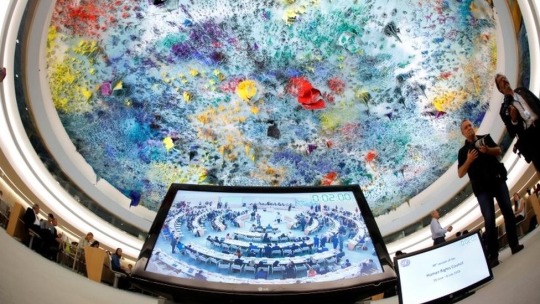
captionThe UN Human Rights Council meets at least three times a year and reviews UN member states' rights records
A dead professor and numerous defunct organisations were resurrected and used alongside at least 750 fake media outlets in a vast 15-year global disinformation campaign to serve Indian interests, a new investigation has revealed.
The man whose identity was stolen was regarded as one of the founding fathers of international human rights law, who died aged 92 in 2006.
"It is the largest network we have exposed," said Alexandre Alaphilippe, executive director of EU DisinfoLab, which undertook the investigation and published an extensive report on Wednesday.
The network was designed primarily to "discredit Pakistan internationally" and influence decision-making at the UN Human Rights Council (UNHRC) and European Parliament, EU DisinfoLab said.
EU DisinfoLab partially exposed the network last year but now says the operation is much larger and more resilient than it first suspected.
REVEALED: Indian Chronicles – how a massive 15-year influence operation successfully targeted the EU & UN with 750+ fake local media and 10+ zombie-NGOs. Executive Summary & full report: http://indianchronicles.eu Here are the facts 👇 (1/n) (EU DisinfoLab @disinfoEU)

There is no evidence the network is linked to India's government, but it relies heavily on amplifying content produced on fake media outlets with the help of Asian News International (ANI) - India's largest wire service and a key focus of the investigation.
The EU DisinfoLab researchers, who are based in Brussels, believe the network's purpose is to disseminate propaganda against India's neighbour and rival Pakistan. Both countries have long sought to control the narrative against the other.
Last year, the researchers uncovered 265 pro-Indian sites operating across 65 countries, and traced them back to a Delhi-based Indian holding company, the Srivastava Group (SG).
Wednesday's report, titled Indian Chronicles, reveals that the operation, run by SG, is spread over at least 116 countries and has targeted members of the European Parliament and the United Nations - raising questions about how much EU and UN staff knew about SG's activities, and whether they could have done more to counter those activities, especially after last year's report.
Mr Alaphilippe said the EU DisinfoLab researchers had never encountered such co-ordination between different stakeholders to spread disinformation.
"During the last 15 years, and even after being exposed last year, the fact that this network managed to operate so effectively shows the sophistication and the drive of the actors behind Indian Chronicles," he said.

Some of the many news sites the investigation found to be fake
"You need more than a few computers to plan and sustain such an action," he said.
The researchers cautioned against "definitively attributing Indian Chronicles to some specific actors such as Indian intelligence services" without further investigation.
Ben Nimmo, a disinformation network expert, told the BBC the uncovered network was "one of the most persistent and complex operations" he had seen, but he too was wary of attributing it to a specific actor.
Mr Nimmo, who is director of investigations at digital monitoring firm Graphika, cited previous examples of privately-run large-scale troll operations. "Just because they're big, it doesn't necessarily mean they're directly run by the state," he said.
The BBC approached the Indian government for comment but had received no response by the time of publication.
Of ghosts and defunct NGOs
One of the most important findings of the open-source investigation was establishing direct links between the Srivastava Group (SG) and at least 10 UN-accredited NGOs, along with several others, which were used to promote Indian interests and criticise Pakistan internationally.
"In Geneva, these think tanks and NGOs are in charge of lobbying, of organising demonstrations, speaking during press conferences and UN side-events, and they were often given the floor at the UN on behalf of the accredited organisations," the report says.
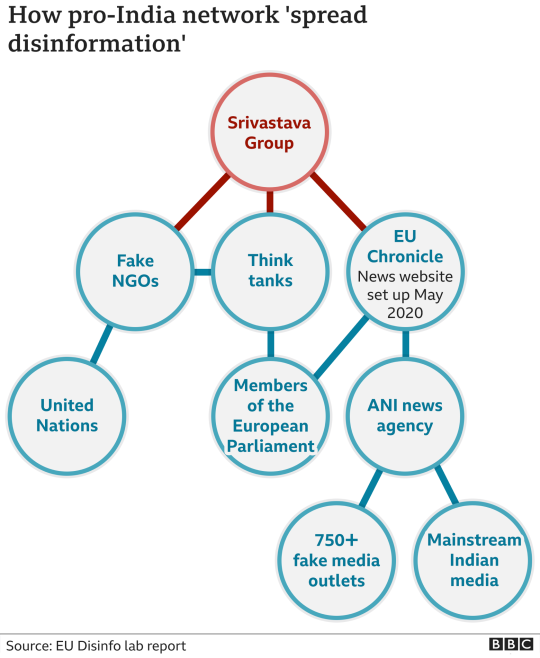
The investigation shows that the operation led by SG began in late 2005, a few months after the UNHRC was founded in its current form.
One particular NGO which caught the eye of the researchers was the Commission to Study the Organisation of Peace (CSOP). The CSOP was founded in the 1930s and won UN-accreditation in 1975 but became inactive later in the 1970s.
The investigation found that a former chairman of the CSOP - Prof Louis B Sohn, one of the 20th Century's leading international law scholars and a Harvard Law faculty member for 39 years - was listed under the name Louis Shon as a CSOP participant at the UNHRC session in 2007 and at a separate event in Washington DC in 2011.
The listings shocked the researchers because Prof Sohn died in 2006.
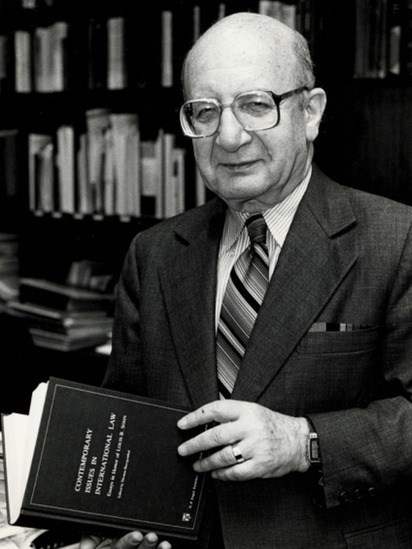
Louis B Sohn "appeared" at events years after he died
The authors dedicated their investigation to the professor's memory, writing that his name had been "usurped by the malicious actors in this report". They said CSOP "had been resurrected, and its identity hijacked in 2005 by the same actors depicted in our first investigation".
The investigation also shows there were several hundred pro-Indian interventions by the non-accredited NGOs, which were repeatedly given the floor at the UNHRC on behalf of the accredited organisations, pursuing the same agenda of maligning Pakistan.
On other occasions, NGOs and organisations which seemingly had nothing to do with Pakistan or India according to their stated objectives would get the opportunity to speak at the UNHRC and target Pakistan.
In March 2019, during the UNHRC's 40th session, United Schools International (USI), another UN-accredited organisation with direct links to SG, allowed its slot to be used by Yoana Barakova, a research analyst with an Amsterdam-based think-tank called the European Foundation for South Asian Studies (EFSAS).
Ms Barakova spoke about "atrocities committed by Pakistan" during the session. She told the BBC that EFSAS was a partner with USI and she was "not responsible for organisational logistics". The BBC received no reply when it contacted the director of EFSAS, who also represented USI at the same session to criticise Pakistan.
Vast pro-Indian 'propaganda' network exposed
Outrage over right-wing Euro-MPs' Kashmir visit
India buzzes with fake news of 'civil war' in Pakistan
Fake pro-China accounts exposed
The primary news agency re-packaging and boosting pro-India content related to SG appears to be ANI, established in 1971, which describes itself as "South Asia's leading multimedia news agency, with more than 100 bureaus in India, South Asia and across the globe". Indian news media, especially broadcast media, thrive on content provided by ANI.
EU DisinfoLab found at least 13 instances of ANI re-publishing mostly anti-Pakistan and sometimes anti-China op-eds by Members of the European Parliament (MEPs), originally published on EU Chronicle, one of the fake news sites linked to SG.
EU Chronicle was born in May this year when EP Today, a site flagged in the previous disinformation report, was simply discontinued and renamed.
The EU DisinfoLab report said: "The actors behind the operation hijacked the names of others, tried to impersonate regular media such as the EU Observer... used the letterhead of the European Parliament, registered websites under avatars with fake phone numbers, provided fake addresses to the United Nations, created publishing companies to print books of the think-tanks they owned.
"They used layers of fake media that would quote and republish one another. They used politicians who genuinely wanted to defend women or minority rights to ultimately serve geopolitical interests and gave a platform to far-right politicians when convergent objectives could be reached."
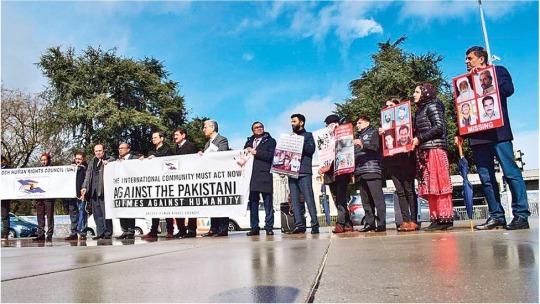
Protesters demonstrate against Pakistan outside the UNHRC in Geneva last year
Mr Alaphilippe said the news agency ANI was being used to give legitimacy to the entire "influence operation", which relied "more on ANI than on any other distribution channel" to give it "both credibility and a wide reach to its content".
ANI's news reports have found space in many mainstream Indian news outlets and publishers. Its content was further reproduced on more than 500 fake media websites across 95 countries, the researchers found.
Demonstrations in Europe conducted by organisations linked to the Srivastava Group have also been covered by ANI, as well as by fake media websites linked to SG.
Focus on the EU and UN
According to the findings of the investigation, the disinformation network had a two-pronged strategy to spread influence.
In Geneva, the think-tanks and NGOs were in charge of lobbying and protesting, and taking the floor at the UNHRC on behalf of accredited organisations.
In Brussels, the focus was on the MEPs, who were taken on international trips and solicited to write "exclusive" op-eds for fake outlets like EU Chronicle, which would then be amplified using ANI, the researchers found.
A group of MEPs appear regularly in the investigation. One of them, French MEP Thierry Mariani, has written two op-eds for EU Chronicle and was also part of a controversial visit to Indian-administered Kashmir last year.
"If the Indian government is behind the newspaper [EU Chronicle], it is not my problem," Mr Mariani, a member of France's far-right National Rally, told the BBC.
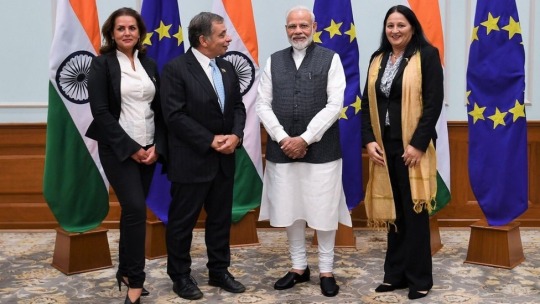
Organisers and delegation members met Indian PM Narendra Modi during the MEPs' controversial 2019 Kashmir trip
"I sign what I want and I feel, it is my opinion. I have connections in [India's governing] Bharatiya Janata Party (BJP) and I support the government of [Narendra] Modi," he said.
Two other MEPs named in the report - Angel Dzhambazki from Bulgaria and Grzegorz Tobiszowski from Poland - denied having written op-eds that were published on EU Chronicle.
The articles under their names were also reproduced on ANI.
How to spot a bot
The human cost of 'fake news'
Seven ways to stop bad information
Asked what the EU is doing to fight disinformation networks, EU spokesperson on foreign affairs Peter Stano pointed to the action taken to expose EP Today last year.
"Exposing the disinformation and those who spread it is one of our main instruments," he told the BBC. "We will continue to identify them and call them out."
But he said questions about finances and transparency of NGOs registered in Brussels were for Belgian authorities to answer.
Rolando Gomez, a spokesperson for the UNHRC, told the BBC that it was the prerogative of NGOs to raise whichever issue they wish to address and whoever they grant space to speak on the floor.
"There are no rules stating that an NGO must speak to specific issues. Doing so would amount to infringing on their freedom of speech," Mr Gomez said.
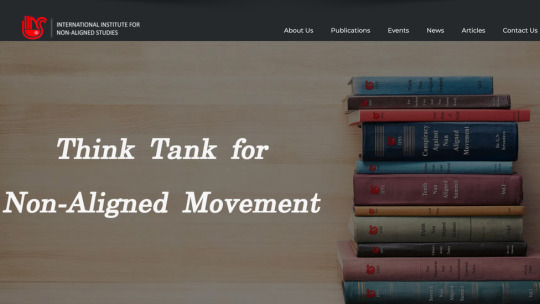
The International Institute of Non-aligned Studies is UN-accredited and openly linked with the Srivastava Group
Gary Machado, managing director of EU DisinfoLab, said he thought the muted reaction to the revelation of the disinformation network was partly because it was "clearly managed by Indian stakeholders".
"Imagine if the same operation was run by China or Russia. How do you think the world would have reacted? Probably with international outrage, leading to public inquiries and probably sanctions," he told the BBC.
But the activities of MEPs named in the report prompted criticism from some of their colleagues.
MEP Daniel Freund from the Greens said fellow members needed to declare their activities.
"There have been at least 24 breaches of rules in the past years. Not a single violation has been sanctioned. So there is little incentive to respect the rules when the worst that can happen is to file a declaration after you have been caught," he said.
Another member, who did not want to be named, said MEPs contributing to sites like EU Chronicles had been identified as "election tourists".
"A ragtag group of MEPs from the bottom of the parliamentary barrel who prefer to travel on sponsored trips by unsavoury governments rather than invest in their mandate," the MEP told the BBC. "How PR stunts with such individuals could be even conceived as helpful is baffling."
The BBC put questions to ANI and to nine other MEPs who have written op-eds for the EU Chronicle and made visits to India, Bangladesh and the Maldives, but received no response.
Who are the Srivastavas - and what next?
The investigations from last year and this year show a man called Ankit Srivastava at the centre of the entire global operation that was uncovered. More than 400 domain names have been bought through Mr Srivastava's private email address or through email addresses belonging to his organisations, the EU DisinfoLab investigations found.

The Srivastava office gate, with the Indian Institute for Non-Aligned Studies and New Delhi Times on the right
Then, there's a case of the mysterious SG-owned tech firm Aglaya. Its website has been inaccessible since at least February this year but in the past the company has advertised products for "hacking/spy tools" and "information warfare services".
Aglaya's marketing brochure mentioned the ability to "hamper country level reputations" and described some of its services as "Cyber Nukes". In a 2017 interview with Forbes magazine, a man called Ankur Srivastava claimed he "only sold to Indian intelligence agencies".
It's unclear what relation, if any, he has to Ankit Srivastava.
A third Srivastava appears to be Dr Pramila Srivastava, chairperson of the group and mother of Ankit Srivastava.
Dr Harshindar Kaur, a paediatrician from the Indian state of Punjab, told the EU DisinfoLab researchers that in 2009 she had been invited to the UNHRC in Geneva to give a lecture on female foeticide when she was threatened by a woman called Dr P Srivastava, who claimed to be a "very senior government official from India".
Dr Kaur told the BBC it was Pramila Srivastava who had threatened her.
The BBC emailed Ankit Srivastava asking him to respond to this and the other allegations in the report, but received no reply. When the BBC visited the firm's offices in Delhi's Safdarjung Enclave, staff there would not answer questions.
What might happen to the network, or how it might evolve, in the light of the latest investigation is unclear.
The authors of Indian Chronicles say their findings "should serve as a call to action for decision-makers to put in place a relevant framework to sanction actors abusing international institutions".
Mr Alaphilippe said following the 2019 investigation there had been "no official communication, no sanction, nothing. This passivity gave a message to Indian Chronicles: you've been exposed, but no consequences".
"We think there should be consequences to disinformation and we expect actions to be taken. The biggest failure from institutions would be if another report is released next year on the same actors with the same techniques," he told the BBC.
"This would mean that EU institutions are ok with foreign interference."
2 notes
·
View notes
Text
جنسی زیادتی کی کوشش، خاتون نے اپنے دانتوں سے آدمی کو مردانگی سے محروم کردیا
https://dailyjangnew.blogspot.com/2020/09/blog-post_21.html
4 notes
·
View notes
Text
Fahad Mustafa to star in with Mahira Khan

The marvelous Mahira Khan and fabulous Fahad Mustafa are to be seen together in the upcoming movie “Quaid-e-Azam Zindabad”. It is going to be a remarkable yet the most sensational collab because they haven’t shared a big screen ever before. But both stars shared desire to work together many times earlier but couldn’t get a chance, but this time they are ready to entertain their fans.
- Advertisement -
“Quaid-e-Azam Zindabad” is a Film Wala Pictures production by renowned filmmakers Nabeel Qureshi and Fizza Ali Meerza. It was earlier announced to be released in the year 2020 but the dates aren’t revealed yet because of pandemic situation. The film is starring two big names from the Pakistani film industry, Fahad Mustafa and Mahira Khan, the audience eagerly awaits the release with impatience.
The genre of the film is going to be action-comedy and the title “Quaid-e-Azam Zindabad” reveals that it is a patriotic film. Fahad Mustafa is known for his hit and blockbuster movies like (Na maloom afrad 1, Na maloom afrad 2 and Actor in law) this time he is surely going to give a new kick to his fans while Mahira Khan is known for her charm and exceptional acting skills that even led him to Bollywood. Let’s see if this duo is going to be the next favorite of Pakistani audience or not.
Is Mahira Khan heroin of Fahad Mustafa in “Quaid-e-Azam Zindabad”?
It’s the most confusing question regarding the characters of both stars. The filmmakers revealed a little about the character of Fahad Mustafa while the character of Mahira Khan is still unrevealed. We know that Fahad Mustafa is going to play the leading character of a scandalous police cop, but the character of Mahira Khan is still suspicious. If we shed a little light on her character we can conclude that she’ll act in opposition to Fahad Mustafa’s character it means either of them is a villain.
Was Mahira Khan excited to work with Fahad Mustafa?
Mahira Khan in an interview told BBC Urdu that she was always willing to work with Fahad Mustafa and even got offers but the timing was never right.
This is like her wish coming true that both stars have worked together in this movie and now the movie is in the post-production period and maybe it’ll be released after the pandemic situation eases.
Whereas, Fahad Mustafa is not much into the interviews, and he shares a little about his feelings working with other actors/actresses that’s why we don’t know if he was excited or not about starring with Mahira Khan for the first time.
Are people excited about the release of “Quaid-e-Azam Zindabad”?
Undoubtedly, this is the most awaited movie for the fans of Mahira Khan and Fahad Mustafa because their fans are already crazy about it. Fahad Mustafa and Mahira Khan from time to time post tweets about the movie and the response of the public is always excellent. When the first poster of the movie was revealed by both actors with cheesy caption lines their fans retweeted with WOW comments. let’s see if the film becomes another record-breaking blockbuster of Fahad Mustafa or not.
Stay with us for more updates – Showbiz Pakistan
1 note
·
View note
Photo
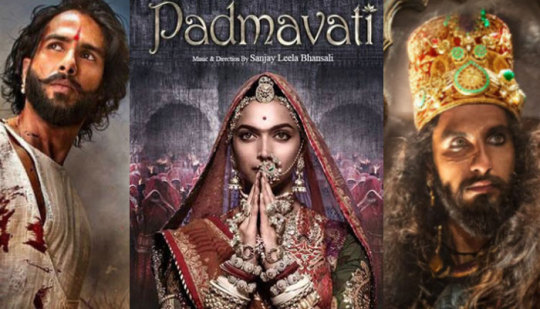
New Post has been published on https://acqro.in/most-controversial-films-in-indian-cinema/
Most Controversial Films in Indian Cinema

Indian cinema has no scarcity of films which either courted major controversy or faced complete ban and were never released in the country. Interestingly, these pictures have garnered rave critical reviews and been well-received at international film festivals. From themes that deal with communal violence to homosexuality and politics, these are some of the most controversial films ever made in India.
Garm Hawa (1973)

Garm Hawa is a film based on an unpublished story by eminent Urdu writer Ismat Chughtai. In 1947, India gained independence from the British colonial rule, but it also came at a heavy price—the division of the country to India and Pakistan. Garm Hawa tells the poignant story of a Muslim businessman who is torn between staying back in India, the land of his forefathers, or joining his relatives in Pakistan. It is one of the best films to showcase the plight of the Muslims in the country in a post-partition era. The film was deferred for eight months, fearing communal violence, before it was released.
Aandhi (1975)

This political drama centres around a woman politician whose appearance was uncannily similar to that of Prime Minister Indira Gandhi. This led the film to face allegations that it was based on her, especially Gandhi’s relationship with her estranged husband. However, the filmmakers had only borrowed the protagonist’s look from the Prime Minister and the rest had nothing to do with her life. Even after its release, the director was asked to remove scenes which showed the lead actress smoking and drinking during an election campaign and the film was completely banned during the national Emergency later that year.
Kissa Kursi Ka (1977)
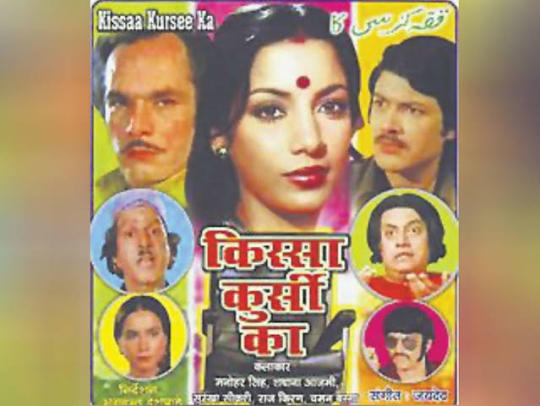
Directed by Member of Parliament Amrit Nahata, the film is a satire on the administrative regime of Prime Minister Indira Gandhi and her son Sanjay Gandhi. Kissa Kursi Ka was submitted for certification from the Central Board of Film Certification in 1975 but the country was put under Emergency the same year and so the film was banned during that entire period. All movie prints, including the masterprint, were confiscated and destroyed during the time, a move which even landed Sanjay in jail.
Bandit Queen (1994)
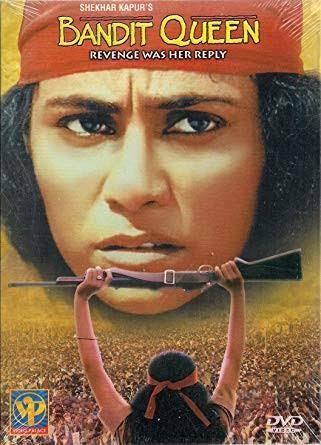
The biographical film is based on the life of Phoolan Devi, a feared woman dacoit who led a gang of bandits in northern India. Phoolan belonged to a poor low caste family and was married to a man three times her age. She later took to a life of crime. The film, directed by Bafta-winner Shekhar Kapur, was criticised for its excessive use of abusive language, sexual content and nudity. Despite the backlash, Bandit Queen went on to win the National Film Award for Best Feature Film.
Fire (1996)
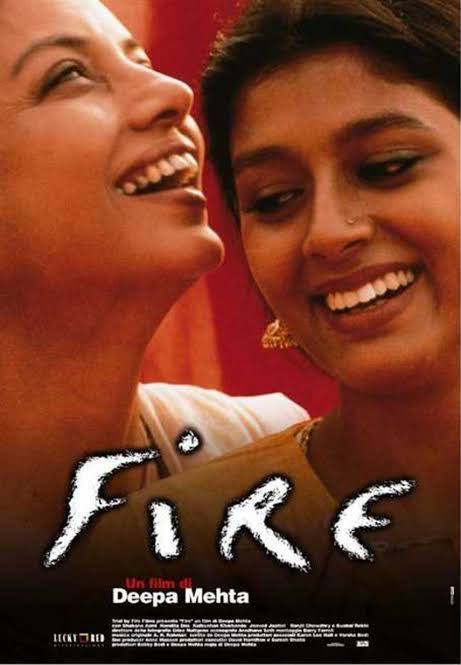
Fire is the first instalment in the Elements trilogy directed by acclaimed filmmaker Deepa Mehta. It is considered a pathbreaking film for being the first Indian cinema to explore homosexual relationship. But on its release, it faced adverse reactions with vandals burning posters and destroying cinemas where the film was being screened. Following the scandal, Fire was retracted briefly and Mehta even led a candlelit protest in New Delhi to oppose the move.
Kama Sutra: A Tale of Love (1996)

Kama Sutra: A Tale Of Love, directed by Mira Nair, was banned in India with the officials stating the film’s sexual content was too harsh for Indian sensitivities. An ironic suggestion, considering the book Kama Sutra originated in India and is easily available for purchase. Protesters labelled the film as unethical and immoral, but it received widespread critical acclaim. Kama Sutra: A Tale Of Love explores the relationship of four lovers in 16th-century India.
Paanch (2003)
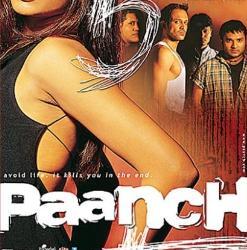
Anurag Kashyap is a pioneer filmmaker, but also one of the most controversial in the Indian film industry. He has never shied away from broaching bold topics, which may not sit well with many in the Indian community. His directorial debut Paanch, which revolves around the life of five band members entangled in a kidnapping plot gone wrong, remains unreleased to this day. Inspired by true life incidents, the drugs, violence and sex depicted in the film was considered inappropriate for the Indian audience.
Hava Aaney De (2004)

Hava Aney De is an Indo-French film which works with the sensitive subject of India-Pakistan war. The Censor Board of India demanded over 21 cuts in the film, but the director Partho Sen-Gupta would hear nothing of it. Hava Aney De, therefore, was never released in India. It did win multiple awards at film events held abroad including Best Film at Durban International Film Festival and the BBC Audience Award at the Commonwealth Film Festival.
Water (2005)

Water is the third and final instalment in Deepa Mehta’s trilogy of films. It tackles the subject of ostracism and misogyny through the lives of widows at an ashram in Varanasi. Water was believed to show the country in a bad light, and even before filming started, right-wing activists wrecked film sets and issued suicide threats. Mehta was eventually forced to move the filming location to Sri Lanka. Not only that, but she had to change the entire cast and shoot the film under a pseudo title, River Moon.
The Pink Mirror (2006)
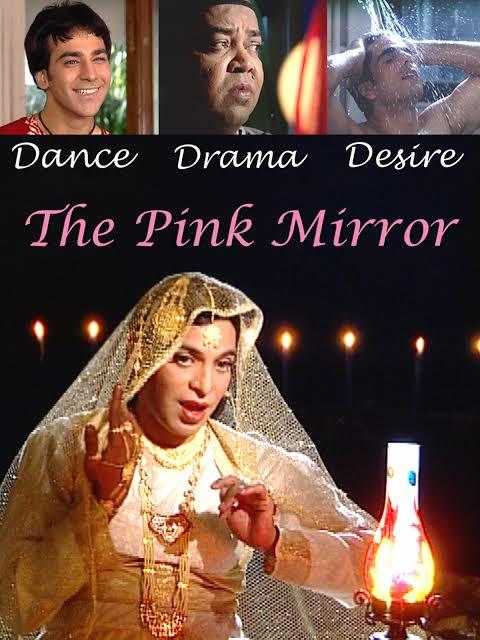
The Pink Mirror is the first mainstream film to have two transsexuals as protagonists. While it was a groundbreaking moment in Indian cinema, the Central Board of Film Certification had other opinions, calling the film “’vulgar and offensive”. The Pink Mirror remains banned in India but it went on to win the Jury Award for Best Feature at the New York LGBT Film Festival and the Best Film of the Festival at Question de Genre in Lille, France. You can catch the film on Netflix now.
Black Friday (2007)

Black Friday, another Anurag Kashyap venture, also faced a temporary ban. It deals with the 1993 Mumbai bombings, and the Bombay High Court decided to suspend the release until the trial was over. This meant that Kashyap had to wait for another three years until Black Friday hit cinemas. The film received praise from both international and national media with the New York Times comparing it to Academy Award nominees Salvador and Munich.
Parzania (2007)

Parzania is inspired by the true story of a 10-year-old boy, Azhar Mody who disappeared after the 2002 Gulbarg Society massacre during which 69 people were killed. This is one of the many incidents which led to the Gujarat riots, one of the worst acts of communal violence the country has ever witnessed. Cinema owners in Gujarat were allegedly threatened not to screen Parzania and the film went on to face an unofficial ban in the state.
Inshallah, Football (2010)

Inshallah, Football is a documentary film about a young boy from Kashmir who dreams of becoming a famous footballer. But his ambitions are crushed when he is not allowed to travel abroad because his father is an alleged militant. Critics felt the documentary showcased the reality of violence-afflicted Kashmir, but it failed to get the green light from the authorities for release in India as they felt the film was critical of how the Indian military operated in the politically sensitive region of Kashmir.
India’s Daughter (2015)
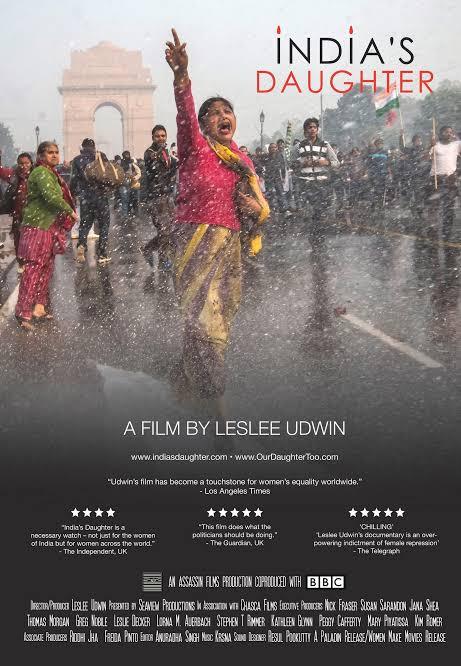
India’s Daughter is a documentary by British filmmaker Leslee Udwin and is based on the horrific Delhi gang rape and murder of 23-year-old student Jyoti Singh in 2012. The film includes an interview with Mukesh Singh, one of the four men convicted in the case. India’s Daughter was banned in India because the rapist airs certain views on gender which show the country in a poor light. These incendiary comments were believed to disturb the peace restored after a countrywide protest following news of the rape.
Padmavati (2017)

Padmavati is the latest Hindi film to court serious controversy as some right-wing groups felt that the film misrepresents history and thus tarnishes the reputation of certain communities in Rajasthan. A bounty was also put on the director and the lead actress, who portrays the historical queen Padmavati in the film. The film was scheduled for release in December 2017 but remains shelved so far. Historians, however, have debated the real life existence of the queen, with many saying she was a fictional character in an epic poem.
3 notes
·
View notes
Text
Youm-e-Shahadat Hazrat Umar-e-Farooq [RadhiAllahu Anhu] | یکم محرم الحرام یوم شہادت
Youm-e-Shahadat Hazrat Umar-e-Farooq [RadhiAllahu Anhu] | یکم محرم الحرام یوم شہادت | Urdu Article | By Hafiz Ifrahim

Youm-E-Shahadat Hazrat Umar-E-Farooq [RadhiAllahu Anhu] یکم محرم الحرام یوم شہادت
Youm-E-Shahadat Hazrat Umar-E-Farooq [RadhiAllahu Anhu] |By Hafiz Ifrahim | امیر المومنین ،خلیفۃ المسلمین حضرت سیدنا عمر بن خطاب رضی اللہ عنہ کی پیدائش مکۃ المکرمہ میں واقعہ فیل سے تیرہ سال بعد قبیلہ بنو عدی میں خطاب بن نفیل کے گھر ہوئی۔ آپؓ صحابی رسول اور مسلمانوں کے دوسرے خلیفہ راشد ہیں۔ آپؓ کا شمار عشرے مبشرہ…
View On WordPress
#Hazrat Umer Farooq#Hazrat Umer the Just#Khalifa-e-Waqt Hazrat e Umer Farooq#Umar ibn Abd al-Aziz#Umer the Just#Untold Stories#Untold Storiess#Untold Story
0 notes